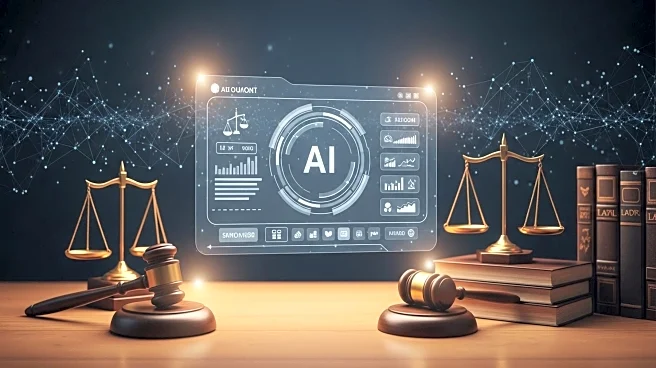What's Happening?
The legal tech industry is grappling with the integration of 'Agentic AI,' a term used to describe AI systems that autonomously perform tasks. While tech vendors are enthusiastic about these AI capabilities, legal professionals express concerns over potential malpractice due to AI's black box decision-making. A report by Plat4orm and Lumen Advisory Group, titled 'From Hours to Outcomes: The Legal Tech Executive Playbook for Value Creation in the AI Era,' aims to bridge the communication gap between tech providers and legal professionals. The report emphasizes the importance of framing AI as a tool for enhancing strategic capacity rather than merely saving time. It suggests that AI should be presented as a secure, expert-curated workflow that maximizes potential while minimizing errors, rather than as an autonomous agent. This approach is intended to reassure legal professionals about the reliability and safety of AI tools.
Why It's Important?
The integration of AI in the legal industry holds significant potential for transforming how legal services are delivered. By addressing communication gaps between tech vendors and legal professionals, the industry can better harness AI's capabilities to improve efficiency and reduce costs. The report's emphasis on strategic capacity rather than time savings could lead to a shift in how legal services are valued, potentially increasing the adoption of AI tools. This development is crucial as it could redefine the legal industry's approach to technology, making it more adaptable and innovative. However, the success of AI integration depends on overcoming skepticism and ensuring that AI tools are perceived as reliable and beneficial.
What's Next?
The report by Plat4orm and Lumen Advisory Group is the first in a series of planned playbooks aimed at guiding legal tech providers in effectively communicating the benefits of AI to their clients. As the legal industry continues to explore AI integration, further reports and strategic guides are expected to be released, providing ongoing support and insights. Legal tech providers may need to refine their communication strategies to align with the recommendations in the report, focusing on building trust and demonstrating the tangible benefits of AI tools. The industry's response to these initiatives will likely shape the future of AI adoption in legal services.
Beyond the Headlines
The ethical implications of AI in legal services are significant, as the technology must be used responsibly to avoid malpractice and ensure client confidentiality. The report's focus on expert-curated workflows highlights the need for ethical considerations in AI development and deployment. Additionally, the cultural shift towards valuing strategic capacity over billable hours could lead to long-term changes in how legal professionals approach their work, potentially fostering a more collaborative and innovative environment.









